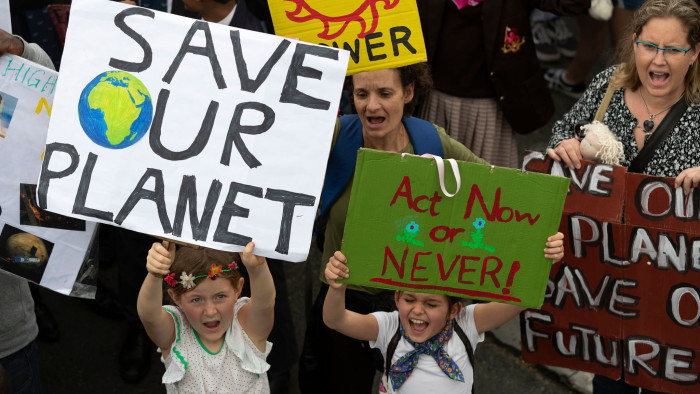Millions of demonstrators join largest climate protest in history

Simply sign up to the Climate change myFT Digest -- delivered directly to your inbox.
Millions of demonstrators took to the streets of the world’s biggest cities on Friday for the largest climate protest in history, ahead of a UN summit at which about 60 countries are expected to make new climate commitments.
The protest movement that began last year when the teenager Greta Thunberg went on a solo “school strike” in Stockholm, has now swelled to cover more than 150 countries. Demonstrations took place in almost all the world’s big cities, from Sydney to New Delhi and Boston.
In New York, students were granted leave to participate in the protest with parental permission — a decision that could see as many as a million public school students on the march on Friday afternoon. Ms Thunberg has said she wants the protest to be “another tipping point” and hopes that “there will be so many people that we cannot look away any more”. Marching with the protesters in New York, where she travelled by boat during the summer, she is expected to address the students later on Friday.
“We know that these consequences will face us during our lifetime, it is already happening now, and it will only get worse,” the 16-year-old said this week. She has called for eliminating fossil fuels and urged governments to take urgent action to reduce emissions of carbon dioxide.
World leaders will gather on Monday at the UN climate summit, including the UK’s Boris Johnson and Germany’s Angela Merkel, who has just announced a set of new climate policies to curb German emissions.

The demonstrations come at a time of rising public concern over climate change — and a time when the climate agenda has been under threat, as trade wars and tensions in the Middle East undermine the impetus for global co-operation that was part of the Paris climate pact in 2015.
The scale of Friday’s protests could give a boost to UN secretary-general António Guterres’s efforts to get countries to fall in line with efforts that would limit the worst effects of global warming. Ahead of Monday’s summit, he called for countries to stop building coal power stations after 2020, reduce fossil fuel subsidies, and commit to reaching net zero emissions by the middle of the century.
“We are losing the fight against climate change,” he said this week. “Young people are leading the debate and they are absolutely right to press us to do better.”
Several leading economies deemed by the UN to be not acting fast enough to combat climate change were not invited to speak at Monday’s summit — including Japan and Australia, which are both big users of coal.

The list of countries that will not appear also includes the US, as President Donald Trump is preparing to formally withdraw the US from the Paris climate pact, and pursuing a pro-fossil fuel agenda.
The world has warmed about 1C since pre-industrial times, and the Paris climate pact — which aims to limit emissions to well below 2C — looks increasingly challenging as global emissions keep rising.
The protesters are demanding that their governments take faster action to address climate change and limit global warming to 1.5C, a goal that would require radical changes, including cutting emission in half by 2030.
The student protesters were also joined by more than 2,000 companies which showed their support by ringing fire alarms, giving employees time off work, or even closing their stores completely so that workers could join in the protest.
The chief executives of Google and Amazon also made big new renewables commitments this week, partly in response to growing pressure from employees, with Amazon pledging to cut its emissions to net zero by 2040.
Additional reporting by Camilla Hodgson in London
Comments